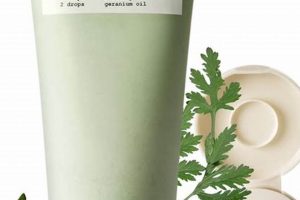Products formulated without animal-derived ingredients constitute a specific segment within the personal care industry. This category encompasses creams, serums, cleansers, and masks, among others, where traditional constituents like beeswax, lanolin, and collagen are substituted with plant-based alternatives. For instance, shea butter may replace lanolin as a moisturizer, or plant-derived hyaluronic acid may be used instead of animal-sourced collagen.
The rising interest in such formulations stems from ethical considerations, environmental consciousness, and perceived health advantages. The exclusion of animal products aligns with the values of individuals who prioritize animal welfare. Furthermore, plant-based ingredients are often touted as being gentler on the skin and more sustainable for the planet, contributing to a reduced environmental footprint. Historically, the availability of these products was limited, but advancements in cosmetic chemistry have led to a wider array of options.
Subsequent sections will delve into the sourcing of ingredients, potential skin benefits, and certification processes associated with these specialized formulations. This analysis aims to provide a deeper understanding of the key considerations involved in selecting and utilizing these types of products within a comprehensive skincare routine.
Essential Considerations for Plant-Based Skin Wellness
Adopting a skin wellness regimen that aligns with plant-based principles requires careful attention to ingredient selection and product efficacy. The following guidance aims to assist in navigating the complexities of this specialized segment of the personal care industry.
Tip 1: Scrutinize Ingredient Lists. Comprehensive examination of product labeling is paramount. Verify the absence of animal-derived substances such as beeswax (cera alba), lanolin, carmine, and collagen. Third-party certification can offer additional assurance.
Tip 2: Prioritize Ethical Sourcing. Beyond the absence of animal components, investigate the sourcing practices of raw materials. Opt for brands committed to fair trade principles and sustainable cultivation of plant-based constituents.
Tip 3: Conduct Patch Testing. Even with plant-derived formulations, allergic reactions can occur. A patch test performed on a small area of skin, such as the inner arm, can help identify potential sensitivities before widespread application.
Tip 4: Maintain Realistic Expectations. Plant-based formulations may not always replicate the exact texture or performance of conventional counterparts. Evaluate products based on their individual efficacy and suitability for specific skin types.
Tip 5: Consider Formulations for Specific Skin Needs. Just as with traditional skincare, select formulations tailored to address particular concerns, such as dryness, acne, or aging. Different plant-based ingredients offer distinct benefits for each skin condition.
Tip 6: Consult with a Dermatologist. Individuals with pre-existing skin conditions should seek professional advice before transitioning to a new regimen. A dermatologist can provide personalized recommendations and address any underlying issues.
Tip 7: Evaluate Packaging Materials. Environmentally conscious consumers should consider the sustainability of product packaging. Opt for brands utilizing recyclable, biodegradable, or refillable containers.
Adhering to these considerations can facilitate the development of a robust skin wellness routine that aligns with ethical values and environmental responsibility, while effectively addressing individual skin concerns.
The subsequent section will address frequently asked questions regarding this approach to skin wellness.
1. Plant-derived alternatives
Plant-derived alternatives form the foundational constituents of formulations that exclude animal products. Their suitability within the personal care industry relies on their efficacy, safety, and ethical sourcing, directly impacting the viability and acceptance of these products.
- Emolliency and Moisturization
Plant oils, such as shea butter and jojoba oil, serve as alternatives to lanolin or mineral oil, providing emollient properties that hydrate and soften the skin. Their lipid profiles mimic the skin’s natural oils, facilitating absorption and reducing the potential for irritation. This characteristic makes them suitable for individuals with sensitive skin or those seeking non-comedogenic formulations.
- Antioxidant Protection
Plant extracts, including green tea and resveratrol, offer antioxidant benefits that combat free radical damage caused by environmental stressors. These antioxidants substitute synthetic antioxidants or animal-derived ingredients that may not provide the same level of protection. Their use contributes to preventing premature aging and maintaining skin health.
- Thickening and Stabilizing Agents
Plant-based gums, such as xanthan gum and guar gum, act as thickening and stabilizing agents in formulations, replacing animal-derived collagen or gelatin. These gums contribute to the texture and consistency of creams, lotions, and serums, ensuring product stability and ease of application. Their origin from renewable sources aligns with sustainability principles.
- Surfactants and Cleansing Agents
Plant-derived surfactants, such as coco glucoside and decyl glucoside, function as cleansing agents that remove dirt and impurities from the skin. These surfactants replace harsh sulfates or animal-derived detergents, offering a gentler cleansing experience that minimizes dryness and irritation. Their biodegradability contributes to reduced environmental impact.
The selection of plant-derived alternatives necessitates a comprehensive understanding of their properties and potential impact on skin health. Responsible sourcing and careful formulation are critical for ensuring the efficacy and safety of products, further establishing their role as a core component in the sector.
2. Ingredient transparency
Ingredient transparency is a cornerstone of credible plant-based personal care. The demand for complete and accessible information regarding product composition directly correlates with consumers’ expectations of authenticity and safety within the category. This expectation stems from a desire to verify the absence of animal-derived constituents and to assess the sustainability and ethical implications of ingredient sourcing. For instance, a product marketed as plant-based would be subject to scrutiny if its ingredient list lacks specificity, obscuring the origin or processing methods of key components. Clear labeling practices, detailing the INCI (International Nomenclature of Cosmetic Ingredients) names and origins of all substances, empower consumers to make informed purchasing decisions.
The absence of ingredient transparency can result in diminished consumer trust and potential harm. Hidden animal-derived ingredients, masked under vague terms or complex chemical names, could trigger allergic reactions or ethical concerns. Furthermore, lack of clarity regarding sourcing practices might inadvertently support unsustainable or unethical operations. A real-world illustration involves the sourcing of palm oil, a common ingredient in plant-based formulations. Without verification of sustainable practices, its procurement can contribute to deforestation and habitat loss. Therefore, robust transparency measures extend beyond the mere identification of ingredients, encompassing the entire supply chain.
In summary, ingredient transparency serves as a crucial validation mechanism for plant-based formulations, facilitating accountability and promoting responsible practices within the personal care industry. Challenges remain in standardizing labeling regulations and effectively communicating complex scientific information to consumers. However, the ongoing emphasis on transparency is essential for fostering a market built on trust, ethical considerations, and demonstrable sustainability.
3. Ethical sourcing
Ethical sourcing constitutes an indispensable element of plant-based formulations, directly influencing the integrity and sustainability of the personal care industry. The connection stems from the inherent philosophical alignment between the avoidance of animal-derived ingredients and the commitment to responsible, humane practices across the supply chain. Without ethical sourcing, the purported benefits of plant-based formulations are undermined, potentially contributing to environmental degradation or social injustice, thereby contradicting the core principles of the movement.
The importance of ethical sourcing becomes evident when considering the potential ramifications of unsustainable practices. For instance, the cultivation of certain plant-based ingredients, such as shea butter or argan oil, can significantly impact local ecosystems and communities. If these ingredients are sourced without regard for fair labor practices, environmental conservation, or community empowerment, the purported benefits of animal welfare are negated by human exploitation and ecological damage. Certifications like Fair Trade or Rainforest Alliance provide consumers with verifiable assurance that ethical practices are upheld throughout the supply chain.
In summary, the integration of ethical sourcing within plant-based formulations transcends mere marketing claims, representing a fundamental responsibility to ensure that the pursuit of animal welfare does not come at the expense of human or environmental well-being. While challenges remain in establishing comprehensive supply chain transparency and enforcing ethical standards across diverse global markets, the prioritization of ethical sourcing is crucial for upholding the credibility and long-term sustainability of the personal care industry.
4. Environmental sustainability
The convergence of environmental sustainability and plant-based personal care arises from the shared objective of minimizing ecological impact. Formulations that exclude animal-derived ingredients often represent a lower environmental footprint compared to their conventional counterparts. This reduction stems from the decreased demand for animal agriculture, a sector recognized for its significant contributions to greenhouse gas emissions, deforestation, and water consumption. Furthermore, the sourcing and processing of plant-based ingredients, when conducted responsibly, can promote biodiversity, soil health, and reduced reliance on synthetic fertilizers and pesticides. The adherence to environmental sustainability is not merely an ancillary benefit of such formulations, but a core principle influencing their production and consumption.
Illustrative examples of this connection are numerous. Consider the production of collagen, a common ingredient in traditional skincare. Its extraction from animal sources necessitates intensive farming practices, generating substantial waste and pollution. Conversely, plant-based alternatives, such as those derived from algae or plant amino acids, can be produced with significantly lower resource intensity and environmental consequences. Similarly, the packaging used for such products can contribute to sustainability efforts. Utilizing recycled materials, biodegradable plastics, or refillable containers reduces waste and minimizes the reliance on virgin resources. The selection of plant-based ingredients and eco-conscious packaging thus constitutes a holistic approach to minimizing environmental impact.
In conclusion, environmental sustainability is intrinsically linked to the ethos and practical application of plant-based personal care. The long-term viability of the sector hinges on the continued commitment to responsible sourcing, reduced resource consumption, and minimized waste generation. While challenges remain in establishing comprehensive life cycle assessments and promoting widespread adoption of sustainable practices, the integration of environmental considerations into every stage of the supply chain is crucial for realizing the full potential of such formulations as a force for positive change.
5. Efficacy testing
Efficacy testing forms a critical bridge between the ethical considerations driving the demand for plant-based personal care and the expectation of tangible results. While the exclusion of animal-derived ingredients aligns with certain values, the ultimate viability of these formulations depends on their ability to deliver demonstrable skin benefits. The absence of robust efficacy testing undermines consumer confidence, potentially relegating plant-based options to a niche market driven solely by ethical considerations, rather than by proven performance. Comprehensive testing, employing rigorous scientific methodologies, provides essential validation of product claims, ensuring that consumers receive genuine value for their investment. The causal relationship is clear: thorough testing leads to substantiated claims, which in turn, fosters consumer trust and market growth.
The practical significance of efficacy testing is exemplified by the evaluation of anti-aging serums. A plant-based serum claiming to reduce wrinkles or improve skin elasticity necessitates rigorous clinical trials comparing its performance to placebo controls or established benchmarks. These trials must assess parameters such as collagen production, hydration levels, and reduction in fine lines using objective measurement techniques, such as image analysis or biopsies. Similarly, plant-based acne treatments require testing to demonstrate their ability to reduce inflammation, control sebum production, and eliminate acne-causing bacteria, often comparing their performance against standard treatments like benzoyl peroxide or salicylic acid. Without such data, claims remain unsubstantiated, potentially misleading consumers and undermining the credibility of the plant-based personal care category as a whole. The lack of efficacy testing can thus lead to consumer disappointment and erosion of trust, hindering the broader acceptance of plant-based alternatives.
In conclusion, efficacy testing is not merely a desirable component but an essential pillar of the plant-based personal care industry. It transforms ethical considerations into tangible value for consumers, bridging the gap between principle and performance. While challenges remain in developing standardized testing protocols and ensuring transparency in data reporting, the commitment to rigorous efficacy testing is paramount for establishing the credibility and long-term sustainability of plant-based options. This commitment safeguards consumer interests, drives innovation, and ensures that plant-based alternatives are recognized not only for their ethical values but also for their scientifically proven benefits.
Frequently Asked Questions
The following section addresses common inquiries related to formulations excluding animal-derived ingredients. These questions aim to clarify aspects regarding product selection, efficacy, and ethical considerations.
Question 1: Is plant-based skincare inherently superior to conventional skincare?
The efficacy of any skincare product, plant-based or conventional, is determined by its formulation, ingredient quality, and suitability for individual skin types. Plant-based formulations are not inherently superior; their advantages lie in ethical sourcing and potential reduction in animal-derived allergens. Individual results vary.
Question 2: Are all ingredients labeled as “natural” suitable for all skin types?
The term “natural” is not regulated in the personal care industry. Ingredients labeled as such may still cause allergic reactions or irritation in sensitive individuals. Patch testing and careful review of ingredient lists remain crucial steps regardless of the “natural” designation.
Question 3: How can one verify if a product is truly formulated without animal-derived ingredients?
Scrutinize ingredient lists for common animal-derived substances such as beeswax (cera alba), lanolin, carmine, and collagen. Seek certifications from reputable organizations (e.g., The Vegan Society, PETA) that independently verify product composition. Consult with brand representatives to confirm ingredient sources if uncertainty persists.
Question 4: Do plant-based formulations offer effective sun protection?
The efficacy of sunscreens is contingent upon the inclusion of UV-filtering agents, regardless of the formulation’s overall composition. Plant-based sunscreens must contain approved mineral or chemical UV filters to provide adequate protection against sun damage. Verify the SPF rating and broad-spectrum protection claims.
Question 5: Are plant-based preservatives as effective as synthetic preservatives?
Plant-based preservatives, such as rosemary extract or vitamin E, can provide antimicrobial and antioxidant properties. However, their efficacy may vary depending on the specific formulation and storage conditions. Products utilizing plant-based preservatives may have shorter shelf lives or require refrigeration. Evaluate the product’s stability and storage instructions.
Question 6: Is the cost of plant-based skincare consistently higher than conventional options?
The price of skincare products is influenced by various factors, including ingredient sourcing, formulation complexity, brand reputation, and marketing costs. While some plant-based options may command a premium, affordable alternatives exist. Price is not a definitive indicator of quality or efficacy.
These FAQs highlight key considerations for discerning consumers seeking formulations excluding animal-derived ingredients. Thorough research and informed decision-making remain essential for optimizing skin wellness.
The next section will summarize the key points.
Vegan Skin Care
The preceding analysis explored various facets of formulations devoid of animal-derived ingredients. Emphasis was placed on ingredient transparency, ethical sourcing, environmental sustainability, and efficacy testing as critical benchmarks for evaluating such products. The discussion underscored the importance of informed consumer choices based on comprehensive ingredient analysis and verifiable certifications. The examination also highlighted the need for plant-based alternatives to demonstrate comparable performance to conventional counterparts through rigorous scientific evaluation.
The continued evolution of vegan skin care hinges on a commitment to responsible practices throughout the supply chain. As consumer awareness increases, the industry must prioritize transparency and sustainability to maintain credibility and promote long-term growth. A sustained focus on scientific validation and ethical considerations will be crucial in shaping the future of this dynamic segment of the personal care market, influencing both consumer behavior and industry standards.


![Best Vegan Mayo Brands: Guide + Reviews [Year] Discover Delicious Vegan Food, Beauty Swaps, and Zero-Waste Tips for a Greener Life Best Vegan Mayo Brands: Guide + Reviews [Year] | Discover Delicious Vegan Food, Beauty Swaps, and Zero-Waste Tips for a Greener Life](https://thisvegangirl.com/wp-content/uploads/2026/03/th-26-300x200.jpg)




